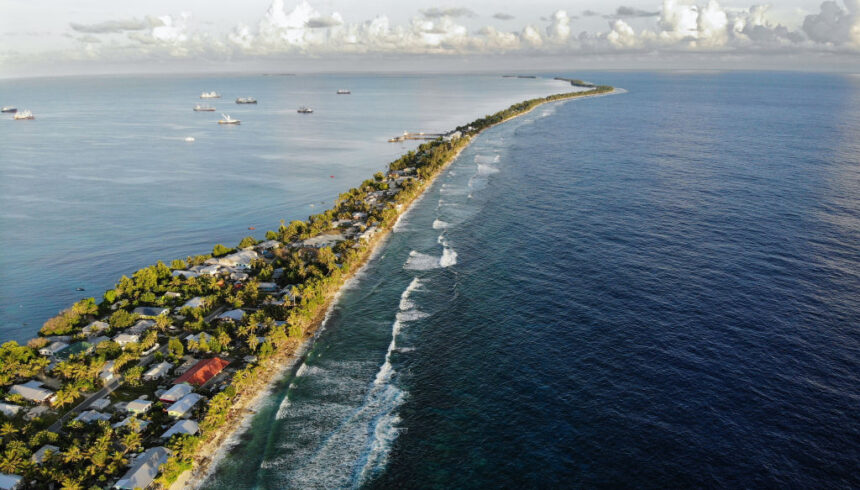The Prime Ministers of Australia and Tuvalu celebrated what was described by Tuvalu’s PM as a ‘groundbreaking arrangement’ aimed at assisting the island nation in fighting climate change.
Australia has pledged to provide up to 280 visas annually to individuals from the small Pacific Island of Tuvalu, which is facing threats from rising sea levels. Under the Falepili Union treaty, set to take effect on Aug. 28, Australia will finance climate adaptation and development projects for Tuvalu.
Tuvalu, the world’s lowest-lying nation, is at risk due to climate change, as stated by its government and the United Nations. Australian Prime Minister Anthony Albanese, in one of his initial actions at the Pacific Islands Forum meeting in Tonga, is scheduled to meet with Tuvaluan counterpart Feleti Teo.
“It’s a groundbreaking arrangement in terms of foreign relations,” remarked Teo.
The treaty also includes a security aspect, with Australia providing a guarantee to assist Tuvalu in defense or security-related issues.
“We will have a country that will be legally bound to aid Tuvalu in times of major national disasters or health pandemics, as well as offering security assurances,” Teo explained.

Tuvalu’s Prime Minister Feleti Teo talks after a swearing-in ceremony in Funafuti, the capital of the south Pacific nation of Tuvalu, on Feb. 28, 2024. Sam Pedro/AFP via Getty Images
With Tuvalu’s population of around 10,000, the migration opportunity suggests that if climate change effects worsen, the entire population could potentially relocate to Australia by the middle of the century. However, Teo believes that most Tuvaluans will choose to remain in their homeland.
“I think most of the people in Tuvalu will stay,” Teo stated. “For Tuvaluans living in Australia, they will have the chance to benefit from the offerings provided to permanent residents by the Australian government.”
Since its announcement, the Falepili Union has faced criticism from both internal and external sources in Tuvalu. Former Prime Minister Enele Sopoaga argued that it compromises Tuvalu’s sovereignty, particularly highlighting concerns about Australia gaining control over Tuvalu’s fishing rights and national security within its Exclusive Economic Zone (EEZ) and territorial waters.
“The sovereign independent Nation of Tuvalu cannot and must not be used as ‘guinea pigs’ in the zero-sum game being dangerously played by metropolitan powers in the Pacific,” Sopoaga expressed.
Albanese addressed these concerns by noting that the agreement was negotiated and signed at Tuvalu’s request.
“We acknowledge that the climate crisis poses the most significant threat to the Pacific region’s livelihoods, security, and well-being,” Albanese stated in Rarotonga in 2023. “We have listened to the needs of our Pacific neighbors and are dedicated to addressing shared challenges in collaboration with Forum members.”
Aug. 28 marks Albanese’s first full day in Nuku’alofa, where he will participate in discussions on the future of New Caledonia, having missed the initial days of the Forum. Meanwhile, Tuvalu will advocate for support for a clause in the summit communique condemning sea level rise.
“Sea level rise is the most severe manifestation of climate change, and we need to address it directly,” Teo emphasized, noting that Australia has indicated initial support for the motion.
“I hope that during the retreat, we can persuade other foreign leaders to support a strong statement on sea level rise coming out of Tonga,” he added.
AAP contributed to this story.
Please rewrite this sentence.
Source link








